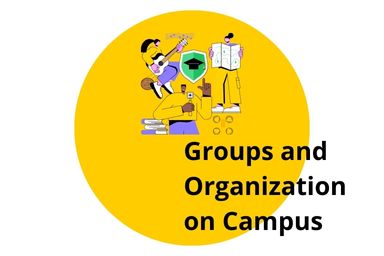
Participating in student groups and organizations may help your students learn and grow during their college experience because students feel a sense of belonging on the campus. Finding a group of others who are interested in the same activities or ideas as your student may help them feel connected on campus. For example, if students enjoy anime, they may be excited to join a group of other students on campus who are interested in anime. In his article, The Importance of Joining Student Organizationsin College, Daren Colbert (2020) suggested these reasons to join college organizations:
- Students have opportunities to build and strengthen their leadership skills.
- Students expand their social and professional networks.
- Students build friendships and connections.
Campuses may have student groups and organizations that are professional in nature, rather than shared interests in a topic. For example, if students are interested in working in childcare and are enrolled in a program that will award them a credential in childcare, they may want to join a student organization that promotes education careers and professionalism. An example of a student organization on many campuses is the Student Children with Exceptionalities Council (SCEC), a group of future teachers and other professionals who are interested in supporting students with disabilities. If a student is pursuing a credential or focus in childcare as their goal in the postsecondary education program, he or she may find the collaboration with other SCEC members helpful. As students progress through classes, their professors will give them information about the professional organizations for students.
Other student groups and organizations are on campus to give students with various identities a place to feel comfortable with other students who share one of their identities. Many campuses have organizations for students who are African American, Native American, Vietnamese or many other ethnicities. Other groups include students who belong to specific religious organizations such as Catholic, Jewish, Muslim, or other religions or belief systems. There are also Women’s Centers, Lesbian, Gay, Bisexual, and Transgender Centers, and groups for international students, just to name a few found on many colleges. Encourage students to search through the college list of organization to find groups that match their interests, preferences, beliefs, and characteristics.
